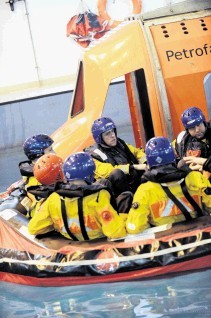
Big questions are being asked at the moment about how competency should be defined within the oil and gas industry.
As managing director I have been encouraged by the strong desire expressed by many to work with us in support of the broader oil and gas skills agenda.
While there is a lot of good work being done there are also various core issues to address and potentially difficult conversations required if the sector is to tackle its challenges once and for all.
I have spoken with many senior industry leaders over the last few weeks and they tell me that key challenges include the continuing need to raise the profile of oil and gas with the aim of attracting more young people to the sector – there is a particular need to appeal to more females – and address the shortage of mid-term expertise in general management, project management, engineering and technical skills.
However, I also hear that many people who are keen to work in the sector are turned away because they don’t match the criteria set by many companies in terms of their competency and experience.
As for applicants, we are almost over-subscribed across the board; but paradoxically, instead of engaging with this widening talent pool, many key vacancies remain unfilled, inter-company competition for the same skilled people is endemic and cost inflation is a reality.
OPITO research shows more than 80% of companies expect to grow with 10,000 new people needed within the next four to five years in order for the industry to capitalise on its growth opportunities. Much activity is ongoing to attract people into oil and gas in the long-term. But it will take a decade for the fresh blood coming into the industry to reach the level of experience which employers demand.
So where are the people we need now going to come from?
An implication of the increasingly tight labour market is the realisation that if it cannot provide large numbers of new recruits with the exact experience we require, then we must look to increase the competency and productivity of the existing and new workforce.
We are asking organisations to look beyond the criteria they have always used and define the core elements of what makes a competent engineer or technician. This is not about lowering standards – it is about identifying the fundamental skills that are important to a role; industry specifics can be learned.
Much more should be done on a grand scale to address the immediate to mid-term shortages and to develop new entrant skills. This includes taking a collective approach to mentoring, giving young graduate staff on-the-job experience and co-ordinating intensive technical training delivered by industry and college experts to up-skill staff quickly.
We should look to using onshore host sites and working with other sectors to train more apprentices in core engineering and craft disciplines and we must pull people through craft conversion schemes from college into jobs. Developing technical and academic expertise through new, funded higher level apprenticeships and improving safety and on-the-job competency via more collective adoption of sector-wide approved standards are also vital.
The challenge does not end with improving training provision; we must be able to adequately measure the competency of the workforce. Organisations previously used the National Vocational Qualification framework but initially found the system did not fully meet needs.
Many firms now run internal competence management systems and do so well. Where we must be careful is in ensuring the focus of these remains on constantly-improving competency rather than merely signalling compliance.
The “tick box” culture is something which OPITO is looking at in some detail. The UK offshore industry was built on the pioneering, innovative spirit which spurred it on in the early days. But with a potential over-focus on compliance and the need to be seen to be doing the right thing, could there be a danger that we are preventing our workforce from thinking for themselves and shackling the very enterprising instinct which brought us to where we are today?
I believe safety should never be compromised and that the increase in safety measures actually serves to demonstrate even further the need for the sector to find the right people to continue pushing it forward.
While the industry recognises the need to address the skills issue, one challenge for us is in driving a fundamental change from it being something we do in good times to being something we always do.
Competency should flow through a business, not just be confined to a department that exists to demonstrate compliance and keep regulatory bodies at bay.
Larraine Boorman, a key managing director of OPITO UK
Recommended for you
